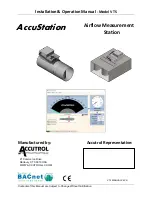
160
ECLYPSE APEX
About Setting Built-in EOL Terminations
The APEX has built-in EOL terminations and biasing. It uses a switch located on the bottom of the
controller to enable the EOL termination and/or bias based on where it is located on a data bus (usu-
ally at the end).
£
If the APEX is located at the end of a data bus, set the switch to position to “END”.
£
If the APEX is located at the end of a data bus and the data bus requires biasing, set the switch
position to “END / BIAS”. There should be a minimum of one device (maximum of two) with biasing
on the data bus.
£
If the APEX is located at the middle of a data bus, set the switch position to “MID”. The controllers
located at the ends of the data bus must have their EOL terminations installed or enabled.
If a controller at the end of the data bus does not have a built-in EOL termination, then add a 120 Ohm
resistor across the device’s terminals.
RESET
MID
END
END/BIAS
Figure 133: APEX EOL switch and reset button
ECB-PTU Series Line-Powered Controllers use DIP switches (found alongside those DIP switches
used to set the MAC address) to enable the build-in EOL resistors and biasing circuitry.
ECB Series 24V-Powered Controllers have built-in EOL terminations. These Controllers use jumpers
to enable the EOL resistors and biasing circuitry.
Refer to the device’s Installation Guide for how to identify and set a controller’s built-in EOL termina-
tions.
Only a Daisy-Chained Data Bus Topology is Acceptable
Use a daisy-chained Modbus RTU data bus topology only. No other data bus topology is allowed.
Only linear, daisy-chained devices provide predictable data bus impedances required for reliable data bus operation.
Only a daisy-chained data bus topology should be specified during the planning stages of a project and implemented
in the installation phase of the project.
Modbus RTU Communication Data Bus Fundamentals
Summary of Contents for ECLYPSE APEX
Page 1: ...User Guide ECLYPSE APEX...
Page 171: ...ECLYPSE APEX_UG_11_EN...












































